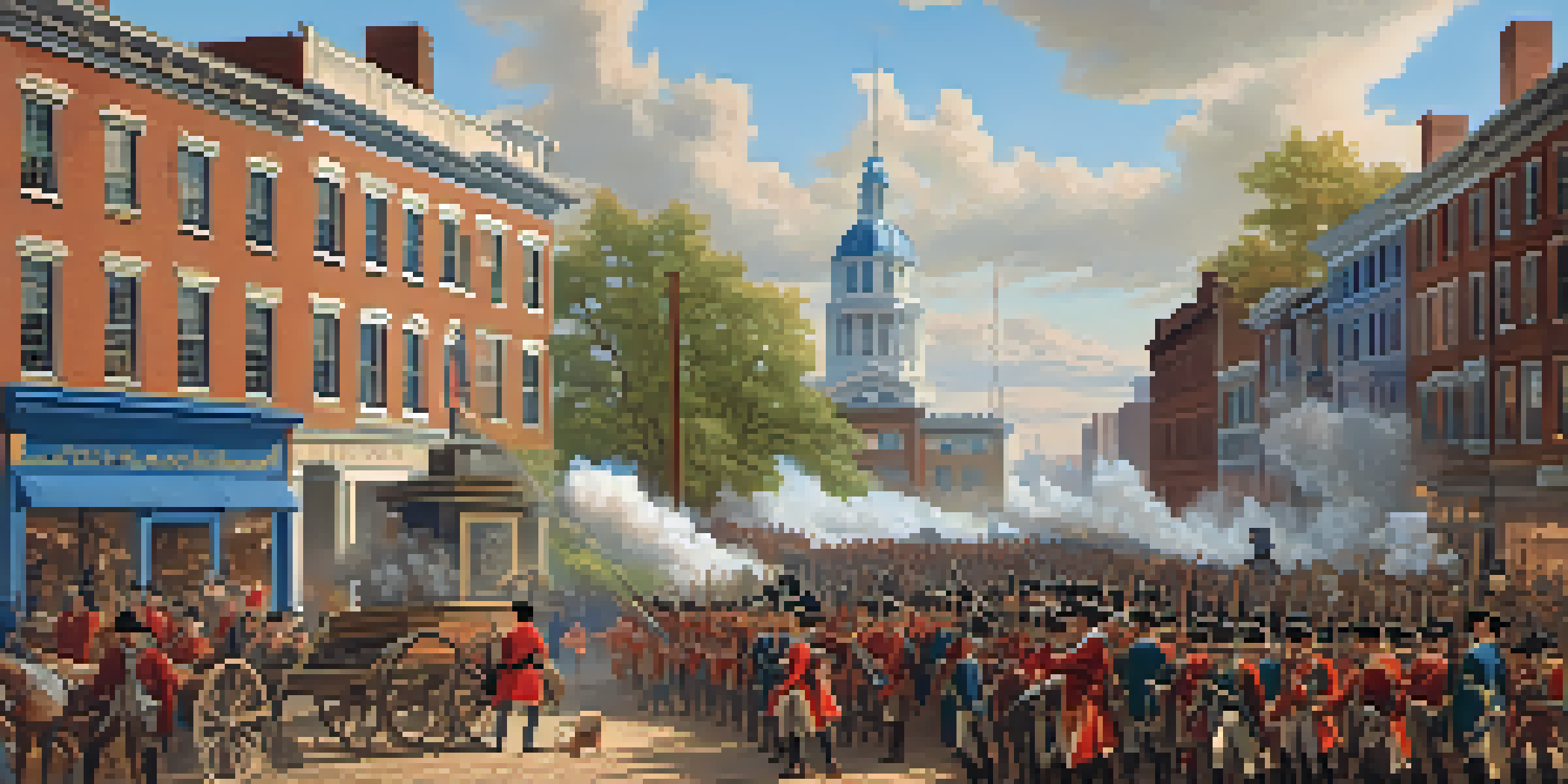Newark’s Role in the American Revolutionary War

Newark's Strategic Importance in the Revolutionary War
Newark, New Jersey, played a critical role during the American Revolutionary War due to its strategic location. Positioned between major cities like New York and Philadelphia, it served as a vital hub for troops and supplies. This geographical advantage allowed both British and American forces to recognize its importance, leading to significant military activity in the area.
In the face of tyranny, the spirit of a community can ignite the fires of freedom.
As a key transportation route, Newark facilitated the movement of troops and resources. The town's proximity to the Passaic River made it ideal for shipping supplies, bolstering both the Continental Army and loyalist forces. This constant flow of materials and soldiers added to the town's prominence during the conflict.
Moreover, Newark's role as a communication center cannot be understated. It became a meeting point for revolutionary leaders and local militias, enhancing coordination among patriots. This collaboration was crucial in rallying support for the war effort and spreading revolutionary ideas throughout the region.
Local Support for the Patriot Cause
The citizens of Newark were largely sympathetic to the patriot cause, forming an essential base of support for the revolution. Many residents actively participated in protests against British taxation and policies, such as the Stamp Act and the Tea Act. This grassroots activism laid the groundwork for a more robust revolutionary movement in the area.

Local organizations, such as the Newark Committee of Correspondence, emerged to facilitate communication and organize resistance against British rule. These groups played a crucial role in mobilizing public sentiment and ensuring that the voices of ordinary citizens were heard. Their collective actions demonstrated the community's dedication to the fight for independence.
Newark's Strategic Location
Newark's position between major cities made it a crucial hub for troops and supplies during the Revolutionary War.
In addition to protests, Newark residents contributed to the war effort through various means. Many volunteered to join the Continental Army, while others provided supplies and resources. This spirit of unity and sacrifice exemplified the community's commitment to achieving freedom from British oppression.
Military Engagements in and around Newark
Newark was not just a hub for logistics; it also witnessed military engagements during the Revolutionary War. One notable event was the Battle of Newark in 1776, where skirmishes took place between American and British forces. Although not as famous as other battles, it featured significant local involvement and showcased the community's resilience.
History is not a burden on the memory but an illumination of the soul.
The skirmishes in Newark were part of a larger campaign that saw the Continental Army attempting to defend key positions in New Jersey. These confrontations highlighted the town's significance in the broader context of the war and illustrated the challenges faced by both sides. The fighting also had a lasting impact on the morale of the local populace.
In the aftermath of these confrontations, Newark remained a strategic location for regrouping and planning subsequent military actions. The town's resilience and determination became emblematic of the spirit of the revolution. This local military activity further solidified Newark's place in the historical narrative of the American fight for independence.
The Role of Newark's Leaders and Activists
Leadership within Newark was pivotal in galvanizing support for the revolutionary cause. Figures such as Jonathan Dayton, a prominent local politician, emerged as key advocates for independence. Dayton's involvement in the Continental Congress helped to amplify Newark's voice in the broader revolutionary movement.
Additionally, local activists played crucial roles in rallying the community. The efforts of women, such as the Daughters of Liberty, were significant in promoting boycotts against British goods. Their contributions not only showcased the involvement of diverse groups but also emphasized the importance of unity in achieving common goals.
Local Patriot Support
The citizens of Newark actively engaged in protests and formed organizations to support the revolutionary cause against British rule.
These leaders and activists not only inspired local citizens but also contributed to the larger revolutionary fervor spreading across the colonies. Their dedication and resilience highlighted how Newark's community was integral to the fight for independence. This legacy of leadership continues to be celebrated in Newark's historical narrative.
Newark as a Refuge for Patriots
During the tumultuous years of the Revolutionary War, Newark also served as a refuge for patriots fleeing from British forces. The town's relatively secure location made it a safe haven for those seeking to escape persecution. This influx of individuals aided in strengthening the local revolutionary sentiment.
The presence of these refugees further diversified Newark's population, bringing together individuals from various backgrounds united by a common cause. This blend of experiences enriched the community and fostered a sense of solidarity among residents. It also illustrated how the war impacted every aspect of life in Newark.
Moreover, the town became a gathering place for strategizing and planning counteractions against British advances. The influx of new ideas and perspectives contributed to the development of revolutionary strategies. This role as a refuge not only provided safety but also played a vital part in sustaining the momentum of the patriot cause.
Economic Impact of the Revolutionary War on Newark
The Revolutionary War had a profound economic impact on Newark, shaping its development during and after the conflict. As trade routes were disrupted by warfare, local businesses faced significant challenges. However, this adversity also prompted innovation as residents sought alternative methods to sustain their livelihoods.
Craftsmen and merchants adapted by producing goods that were in demand due to British blockades. This shift not only supported the local economy but also contributed to a burgeoning sense of independence. Newark's ability to pivot during these tough times showcased the resilience of its community.
Economic Resilience Amid War
Despite challenges from disrupted trade routes, Newark's residents adapted and innovated, laying the groundwork for post-war economic growth.
In the long term, the war laid the groundwork for Newark's post-war economic recovery and growth. The skills and networks developed during the conflict helped the town transition into a more robust economy. This transformation demonstrated how Newark's experience during the war shaped its future success.
Legacy of Newark's Revolutionary War Involvement
The legacy of Newark's involvement in the American Revolutionary War is still evident today. The town's rich history is commemorated through various monuments, historical sites, and educational programs. These initiatives serve as a reminder of the sacrifices made by local residents in their quest for independence.
Furthermore, Newark's role in the war has become an integral part of the region's identity. Celebrations and events honoring the town's revolutionary past foster a sense of community pride and awareness. This ongoing connection to history keeps the spirit of the revolution alive for future generations.

Ultimately, Newark's contributions during the Revolutionary War highlight the importance of local actions in shaping national narratives. The town's resilience, unity, and commitment to the cause of freedom serve as a testament to the power of community in times of adversity. This legacy continues to inspire and inform the town's present and future.